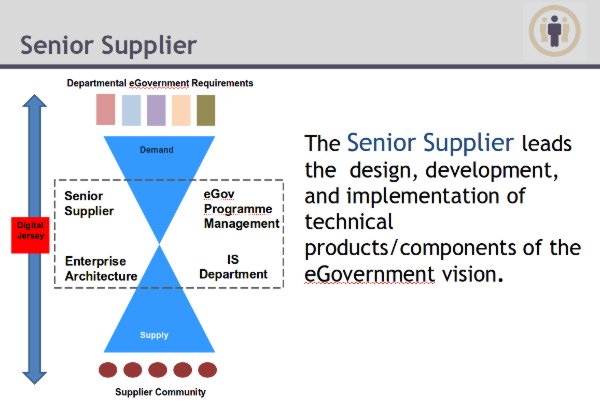 I attended the Sourcing eGovernment breakfast last week hosted by Digital Jersey and the States of Jersey. It was a disappointing affair and it reinforced my opinion that the States’ vision for the future needs more work. It looks like all government services will continue to be outsourced to local companies which sell only closed-source solutions. There is no real decision being made here, it is “Pick any of these companies who sell only Microsoft products, you can choose whatever you like”. It doesn’t take an IT expert to see where that will lead.
I attended the Sourcing eGovernment breakfast last week hosted by Digital Jersey and the States of Jersey. It was a disappointing affair and it reinforced my opinion that the States’ vision for the future needs more work. It looks like all government services will continue to be outsourced to local companies which sell only closed-source solutions. There is no real decision being made here, it is “Pick any of these companies who sell only Microsoft products, you can choose whatever you like”. It doesn’t take an IT expert to see where that will lead.
Jersey is sometimes called Microsoft Island because local government and industry have embraced proprietary software and vendor lock-in. This may be a legacy of the Financial sector (which is notoriously risk-averse and slow to upgrade). If you’ve tried using the government’s CAESAR website to pay GST online you’ve seen why this is a bad idea. Because the code for the site was outsourced and is proprietary, Jersey’s government cannot improve it. We are now stuck with this bad decision. The only option is to spend even more to have the vendor upgrade it, or scrap it and start over with a new platform.
During the breakfast, it was announced that members of Jersey’s government would be visiting Estonia to study the Baltic state’s very successful e-government initiative. This follows the UK’s Government Digital Service visit to Estonia in 2012 to look at how they are so successful. Estonia is a perfect example of how to make e-government work and open source software is central to their strategy. They started in 1995 and continue using open source software today. Estonia have even posted their e-voting source code to public repositories on GitHub, which is brilliant! You cannot look at Estonia’s e-government strategy and not see how fundamentally important open source is. They create or adapt existing software, release it back to the public, and others can re-use, test, and further improve it. You can’t do that with Microsoft, your only option is to pay them and hope for a fix. This leaves you in a very subordinate position, strategically.
Two other large migrations to successful open source platforms are the City of Munich and the French Gendarmerie both switching tens of thousands of computers over to Linux, an open source Operating System. Both migrations took about ten years and started with a clear vision to move away from expensive and inferior proprietary software. That kind of vision requires strong leadership and determination and unfortunately we don’t yet have that here in Jersey.
The Senior Supplier

The 'Senior Supplier' will be the gatekeeper for all things e-government
At the breakfast, two things stood out for me. Firstly, Neil Wells, Director of Information Services for the States of Jersey was speaking about how e-government would be sourced (outsourcing was assumed) and he spoke of a role called the Senior Supplier. “This could even be an alliance”, he said, which was a rather interesting choice of words. Second, we were asked to come up with some questions that each table would ask Neil. One of ours was “What are your plans for open-source software?” Neil skipped that and simply did not answer our question.
I like Neil and I’ve spoken about this with him before. I like that he says “I’m impatient” and that he is ready to make changes which are urgently needed. What remains unclear to me is whether there is the political will for the States to examine some open source success stories and adapt them for Jersey. I don’t expect Neil to put his career on the line and order sweeping changes like Estonia, Munich, and France have done without assurances from above. That isn’t fair or realistic.
This mirrors my experience with Digital Jersey and their policy paper on sourcing Information Services. The first draft literally did not contain the word “open”, and the final draft only made a token mention of it. This is radically different from other jurisdictions. You would really have to search to find another government so determined to ignore and avoid anything to do with open source. While I’d like to see a migration to 100% open-source I recognise this is not some magical solution that we can switch to and live happily ever after. What lies ahead is probably a mix of open and closed source software running our e-government services. On an island our size we may need to make concessions and pick some ready-made software for niche applications, while keeping the mainstream functionality open source.
So What’s Next?
If you care about government services in Jersey, and if you want to see us learning from other successful e-goverment initiatives, now is the time to discuss this with your representatives in government. Handing everything over to one or two local IT companies will be a costly mistake and is a completely different model from other successful jurisdictions. This is about control and our rights to build future government services and applications.
A successful e-government strategy will require more than outsourcing everything to Microsoft. Let’s make sure our representatives in the States understand this and that doing so will be an expensive mistake, both financially and politically.